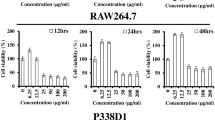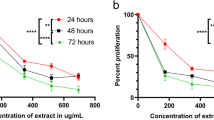Abstract
Acute erythroleukemia is an uncommon subtype of acute myeloid leukemia which has been considered to be a subtype of AML with a worse prognosis. Intensive chemotherapy is the first line of treatment. In recent years, the effect of kefir on some malignancies has been experimented. Kefir is a kind of beverage, which obtained by incubation of kefir grains with raw milk. Kefir grains are a symbiotic complex of different kinds of yeasts and bacteria, especially lactic acid bacteria which gather in a mostly carbohydrate matrix, named kefiran. We investigated the effect of kefir on acute erythroleukemia cell line (KG-1) and peripheral blood mononuclear cells (PBMCs). The cell line and PBMCs were treated with different doses of kefir and milk and incubated for three different times. We used Polymixin B to block the lipopolysaccharide and NaOH (1 mol/l) to neutralize the acidic media. Viability was detected by MTT assay. Apoptosis and necrosis were assessed by annexin–propidium iodide staining. Our results showed that kefir induced apoptosis and necrosis in KG-1 cell line. It was revealed that kefir decreased proliferation in erythroleukemia cell line. We did not observe a remarkable effect of kefir on PBMCs. Our study suggested that kefir may have potential to be an effective treatment for erythroleukemia.









Similar content being viewed by others
References
Estey EH. Acute myeloid leukemia: 2013 update on risk-stratification and management. Am J Hematol. 2013;88(4):317–27.
Hasserjian R, Howard J, Wood A, Henry K, Bain B. Acute erythremic myelosis (true erythroleukaemia): a variant of AML FAB-M6. J Clin Pathol. 2001;54(3):205–9.
Stoneking CJ, Mason MJ. Mg2+ modulation of the single-channel properties of KCa3. 1 in human erythrsoleukemia cells. Pflügers Arch Eur J Physiol. 2014;466(8):1529–39.
McHayleh W, Sehgal R, Redner RL, Raptis A, Agha M, Natale J, et al. Mitoxantrone and etoposide in patients with newly diagnosed acute myeloid leukemia with persistent leukemia after a course of therapy with cytarabine and idarubicin. Leuk Lymphoma. 2009;50(11):1848–53.
Kaspers G, Creutzig U. Pediatric acute myeloid leukemia: international progress and future directions. Leukemia. 2005;19(12):2025–9.
Rubnitz JE, Lensing S, Zhou Y, Sandlund JT, Razzouk BI, Ribeiro RC, et al. Death during induction therapy and first remission of acute leukemia in childhood. Cancer. 2004;101(7):1677–84.
Riley LC, Hann IM, Wheatley K, Stevens R. Treatment-related deaths during induction and first remission of acute myeloid leukaemia in children treated on the tenth medical research council acute myeloid leukaemia trial (MRC AML10). Br J Haematol. 1999;106(2):436–44.
Okamoto Y, Ribeiro RC, Srivastava DK, Shenep JL, Pui C-H, Razzouk BI. Viridans streptococcal sepsis: clinical features and complications in childhood acute myeloid leukemia. J Pediatr Hematol Oncol. 2003;25(9):696–703.
Lehrsnbecher T, Varwig D, Kaiser J, Reinhardt D, Klingebiel T, Creutzig U. Infectious complications in pediatric acute myeloid leukemia: analysis of the prospective multi-institutional clinical trial AML-BFM 93. Leukemia. 2004;18(1):72–7.
Creutzig U, Zimmermann M, Reinhardt D, Dworzak M, Stary J, Lehrsnbecher T. Early deaths and treatment-related mortality in children undergoing therapy for acute myeloid leukemia: analysis of the multicenter clinical trials AML-BFM 93 and AML-BFM 98. J Clin Oncol. 2004;22(21):4384–93.
Murati A, Brecqueville M, Devillier R, Mozziconacci M-J, Gelsi-Boyer V, Birnbaum D. Myeloid malignancies: mutations, models and management. BMC Cancer. 2012;12(1):304.
Grimwade D. The changing paradigm of prognostic factors in acute myeloid leukaemia. Best Pract Res Clin Haematol. 2012;25(4):419–25.
Wszolek M, Kupiec-Teahan B, Guldager HS, Tamine A. Production of kefir, koumiss and other related products. Fermented Milks. 2006:174–216.
Rattray F, O’Connell M. Fermented milks kefir. Encycl Dairy Sci. 2011;2:518–24.
Magalhães KT, Pereira GVDM, Campos CR, Dragone G, Schwan RF. Brazilian kefir: structure, microbial communities and chemical composition. Braz J Microbiol. 2011;42(2):693–702.
Garrote GL, Abraham AG, De Antoni GL. Microbial interactions in kefir: a natural probiotic drink. In: Biotechnology of lactic acid bacteria: novel applications. Oxford: Wiley-Blackwell; 2010. p. 327.
Farnworth ERT. Handbook of fermented functional foods. Boca Raton: CRC Press; 2008.
Marco ML, Pavan S, Kleerebezem M. Towards understanding molecular modes of probiotic action. Curr Opin Biotechnol. 2006;17(2):204–10.
Metchnikoff E. Sur la flore du corps humain. In: Memoirs and proceedings of manchester literary and philosophical society, vol. 45. pp. 1–38. 1909 Rousettes et microbes. Introduction. Ann Inst Pasteur. 1901.
Veer VT, Van Leer EM, Rietdijk A, Kok FJ, Schouten EG, Hermus RJ, et al. Combination of dietary factors in relation to breast-cancer occurrence. Int J Cancer. 1991;47(5):649–53.
van’t Veer P, Dekker JM, Lamers JW, Kok FJ, Schouten EG, Brants HA, et al. Consumption of fermented milk products and breast cancer: a case-control study in The Netherlands. Cancer Res. 1989;49(14):4020–3.
Le MG, Moulton LH, Hill C, Kramar A. Consumption of dairy produce and alcohol in a case-control study of breast cancer. J Natl Cancer Inst. 1986;77(3):633–6.
Cramer D, Willett W, Bell D, Ng W, Harlow B, Welch W, et al. Galactose consumption and metabolism in relation to the risk of ovarian cancer. The Lancet. 1989;334(8654):66–71.
Biffi A, Coradini D, Larsen R, Riva L, Di Fronzo G. Antiproliferative effect of fermented milk on the growth of a human breast cancer cell line. Nutr Cancer. 1997;28(1):93–9.
Park H, Makepeace C, Lyons J, Song C. Effect of intracellular acidity and ionomycin on apoptosis in HL-60 cells. Eur J Cancer. 1996;32(3):540–6.
Lee H-S, Park HJ, Lyons JC, Griffin RJ, Auger EA, Song CW. Radiation-induced apoptosis in different pH environments in vitro. Int J Radiat Oncol Biol Phys. 1997;38(5):1079–87.
Frey EA, Finlay BB. Lipopolysaccharide induces apoptosis in a bovine endothelial cell line via a soluble CD14 dependent pathway. Microb Pathog. 1998;24(2):101–9.
Bannerman DD, Tupper JC, Ricketts WA, Bennett CF, Winn RK, Harlan JM. A constitutive cytoprotective pathway protects endothelial cells from lipopolysaccharide-induced apoptosis. J Biol Chem. 2001;276(18):14924–32.
Bannerman DD, Sathyamoorthy M, Goldblum SE. Bacterial lipopolysaccharide disrupts endothelial monolayer integrity and survival signaling events through caspase cleavage of adherens junction proteins. J Biol Chem. 1998;273(52):35371–80.
Warren JR. Polymyxin B suppresses the endotoxin inhibition of concanavalin a-mediated erythrsocyte agglutination. Infect Immun. 1982;35(2):594–9.
Venugopal SK, Devaraj S, Yuhanna I, Shaul P, Jialal I. Demonstration that C-reactive protein decreases eNOS expression and bioactivity in human aortic endothelial cells. Circulation. 2002;106(12):1439–41.
Topuz E, Derin D, Can G, Kürklü E, Çınar S, Aykan F, et al. Effect of oral administration of kefir on serum proinflammatory cytokines on 5-FU induced oral mucositis in patients with colorectal cancer. Invest New Drugs. 2008;26(6):567–72.
Maalouf K, Baydoun E, Rizk S. Kefir induces cell-cycle arrest and apoptosis in HTLV-1-negative malignant T-lymphocytes. Cancer Manag Res. 2011;3:39.
Furukawa N, Matsuoka A, Takahashi T, Yamanaka Y. Anti-metastatic effect of kefir grain components on lewis lung carcinoma and highly metastatic B 16 melanoma in mice. J Agric Sci Tokyo Univ Agric. 2000;45(1):62–70.
de LeBlanc ADM, Matar C, Farnworth E, Perdigon G. Study of cytokines involved in the prevention of a murine experimental breast cancer by kefir. Cytokine. 2006;34(1):1–8.
Kim SY, Lee KW, Kim JY, Lee HJ. Cytoplasmic fraction of Lactococcus lactis ssp. lactis induces apoptosis in SNU-1 stomach adenocarcinoma cells. BioFactors. 2004;22(1–4):119–22.
Iyer C, Kosters A, Sethi G, Kunnumakkara AB, Aggarwal BB, Versalovic J. Probiotic Lactobacillus reuteri promotes TNF-induced apoptosis in human myeloid leukemia-derived cells by modulation of NF-κB and MAPK signalling. Cell Microbiol. 2008;10(7):1442–52.
Ghoneum M, Felo N, Agrawal S, Agrawal A. A novel kefir product (PFT) activates dendritic cells to induce CD4+ T and CD8+ T cell responses in vitro. Int J Immunopathol Pharmacol. 2015;28(4):488–96.
Chiu Y-H, Hsieh Y-J, Liao K-W, Peng K-C. Preferential promotion of apoptosis of monocytes by Lactobacillus casei rhamnosus soluble factors. Clin Nutr. 2010;29(1):131–40.
Acknowledgments
This study was conducted with financial support of Isfahan University of Medical Sciences (IRAN) with grant number 393766.
Author information
Authors and Affiliations
Corresponding author
Ethics declarations
Conflict of interest
The authors declare that they have no conflict of interest.
Ethical approval
This study was approved by the local ethics committee of Isfahan University of Medical Sciences (IRAN) and the studies have been approved by the appropriate institutional and/or national research ethics committee and have been performed in accordance with the ethical standards as laid down in the 1964 Declaration of Helsinki and its later amendments or comparable ethical standards.
Rights and permissions
About this article
Cite this article
Jalali, F., Sharifi, M. & Salehi, R. Kefir induces apoptosis and inhibits cell proliferation in human acute erythroleukemia. Med Oncol 33, 7 (2016). https://doi.org/10.1007/s12032-015-0722-8
Received:
Accepted:
Published:
DOI: https://doi.org/10.1007/s12032-015-0722-8




